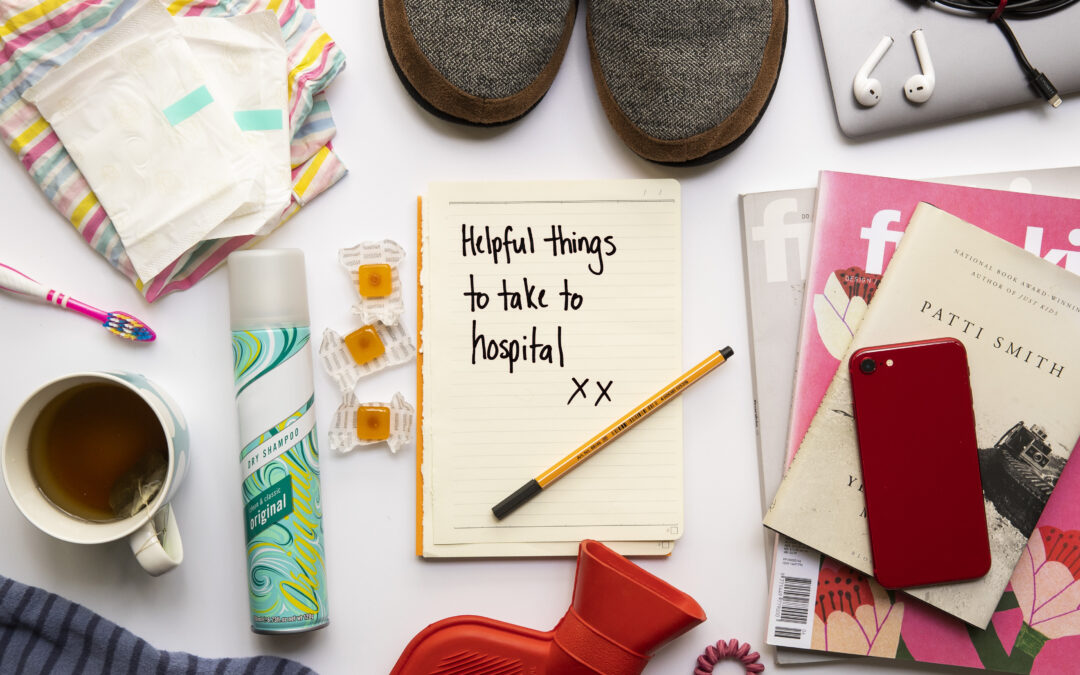I’m inherently inquisitive when it comes to anything medical. I like to research and understand things and have been known to do a bit of a Doctor Google on occasion. Naturally, when I was scheduled in for my first endo surgery, I did my research. I was a fiend for lists and reviews. It was as if I was researching a new car or home appliance. I wanted to know everything hoping more knowledge would provide my racing mind with clarity and calm. What would the prep involve? What would be best to take to the hospital? How long would it take to recover? What would the scars look like? What would it be like going under the knife?

I wanted to share some of my learnings from my own surgeries, what I’ve found helpful and what it has been like for me. I do this in the hope that others searching for information might find some calm also.
In doing so I want to reinforce that endometriosis is individual, the treatment and surgeries are unique and there is no one size fits all approach. I also want to recognise my incredible privilege. I have been able to afford quality treatment from a specialist that I trust and respect and for that, I count myself incredibly fortunate.
Here are some of the things I’ve learnt along the way.
Bowel prep
Not every surgery will involve this, but all mine have. I read a lot of user reviews regarding the bowel preparation which sounds ridiculous but I wanted to know about the process.
My first experience was awful. This was probably more to do with the fact that there was a blackout during the process rather than the prep itself. It was also freezing and my partner had to set up camera lights so I was able to navigate to the bathroom without tripping over the furniture whilst dressed as if I was about to go on an arctic exploration.
I preferred to drink the solution when it was very cold – it just seemed to go down better. So I popped it in the freezer half an hour before I was due to consume it.
The sensation is not pleasant, but I didn’t feel nauseous like I have when I’ve had gastro, just exhausted and a bit weak by the end.
Surgery
I’ve had three laparoscopic surgeries, the first to remove a large ovarian cyst where endometriosis was found and excised. The second to remove more endo and the third to ‘untether’ my ovary and some more excision.
During each laparoscopy, four small cuts were made in my abdomen, one of them in my belly button. My surgeon has tried to use the same incision points each time he has operated to minimise the visible scars.
During the surgery, tubes are inserted through the incisions. Carbon dioxide gas is then pumped through the tubes to inflate the abdomen and allow the surgeon to perform surgery with the aid of a camera.
I woke up from each of the surgeries in pain and feeling a bit nauseous. Both the pain and nausea were managed during my time in hospital. For one surgery I woke up with a drain and catheter – neither of which I expected.
Each surgery has been booked for a day procedure, but I have ended up staying in hospital one or two nights to recover.
I experienced some residual pain from the carbon dioxide in the tips of my shoulders. Which had I not known about would have definitely freaked me out. For me, this grew worse in the days after surgery and wasn’t immediate.
Recovery
My recoveries have been a mixed bag. The day I came home from my first surgery my partner was admitted to hospital for suspected salmonella which made everything a bit more dramatic. I was determined not to get it so I stumbled about the apartment in my compression socks, attempting to disinfect every surface while clutching a heat pack.
I also rushed back to work after the first surgery a bit too quickly. A few weeks later I was ordered back to rest due to a partial bowel obstruction.
The second two recoveries have been better but each has taken longer than the last. I feel as though my body has needed more time to rest and heal as things have progressed.
In the lead up to my first surgery, I read stories about people recovering in a couple of days. I have yet to meet anyone for whom this is the case. Depending on the nature of the surgery, how long you have been in pain for, and how you react to the surgery, recovery will vary. I’ve also found it helpful to remind myself that the process of recovery is not linear. You’ll likely have some good days followed by some not so good days.
Throughout this process, I’ve curated my own lists and tips. So, in case you or someone you know has a penchant for lists here they are:
Pre-surgery
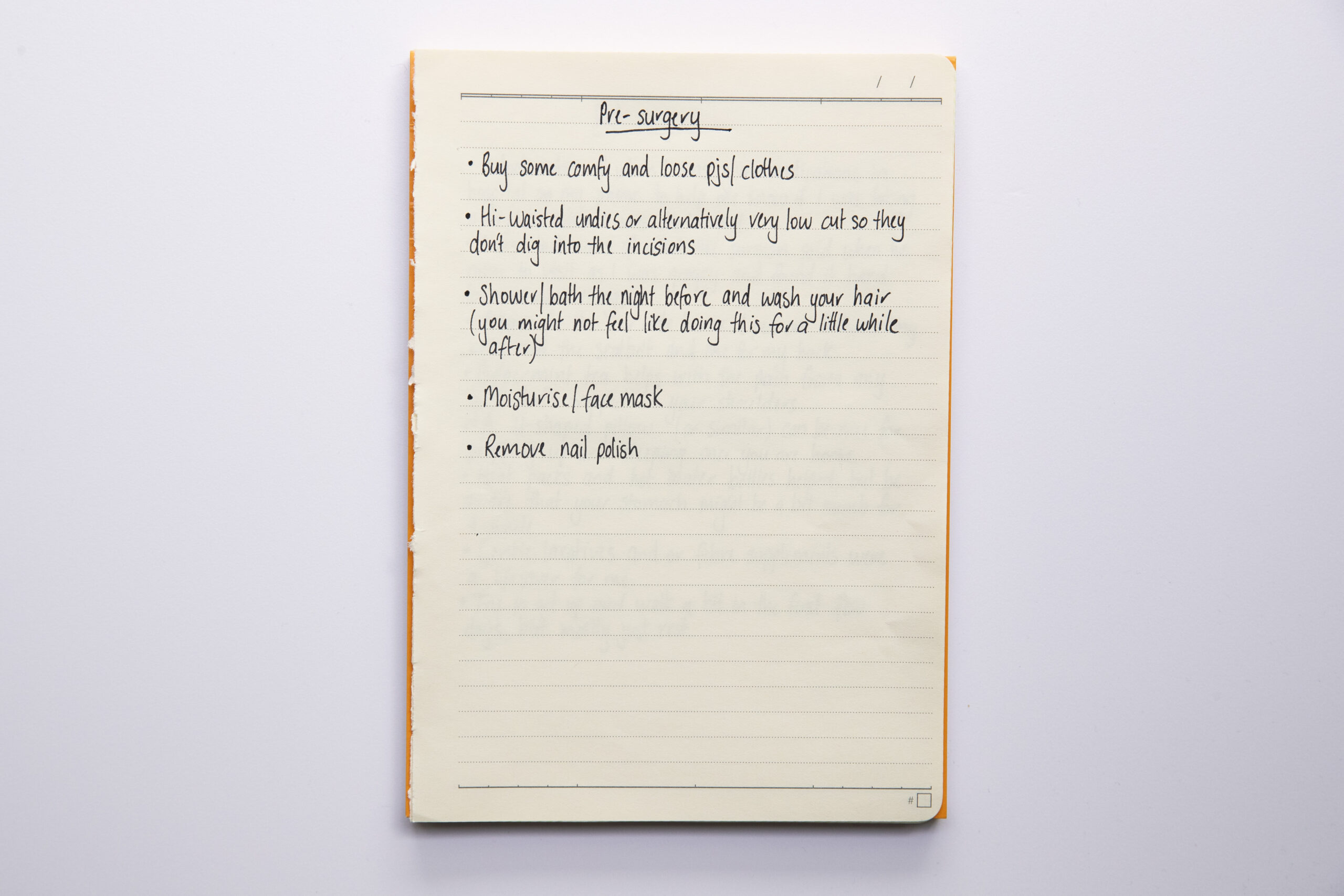
- Buy some comfy and loose pjs/ clothes
- Hi-wasted undies that aren’t too tight or alternatively very low cut so they don’t dig into the incisions
- Shower/bath the day of the surgery or night before and wash your hair (you might not feel like doing this for a little while after)
- Moisturise/face mask
- Remove nail polish
Bowel prep
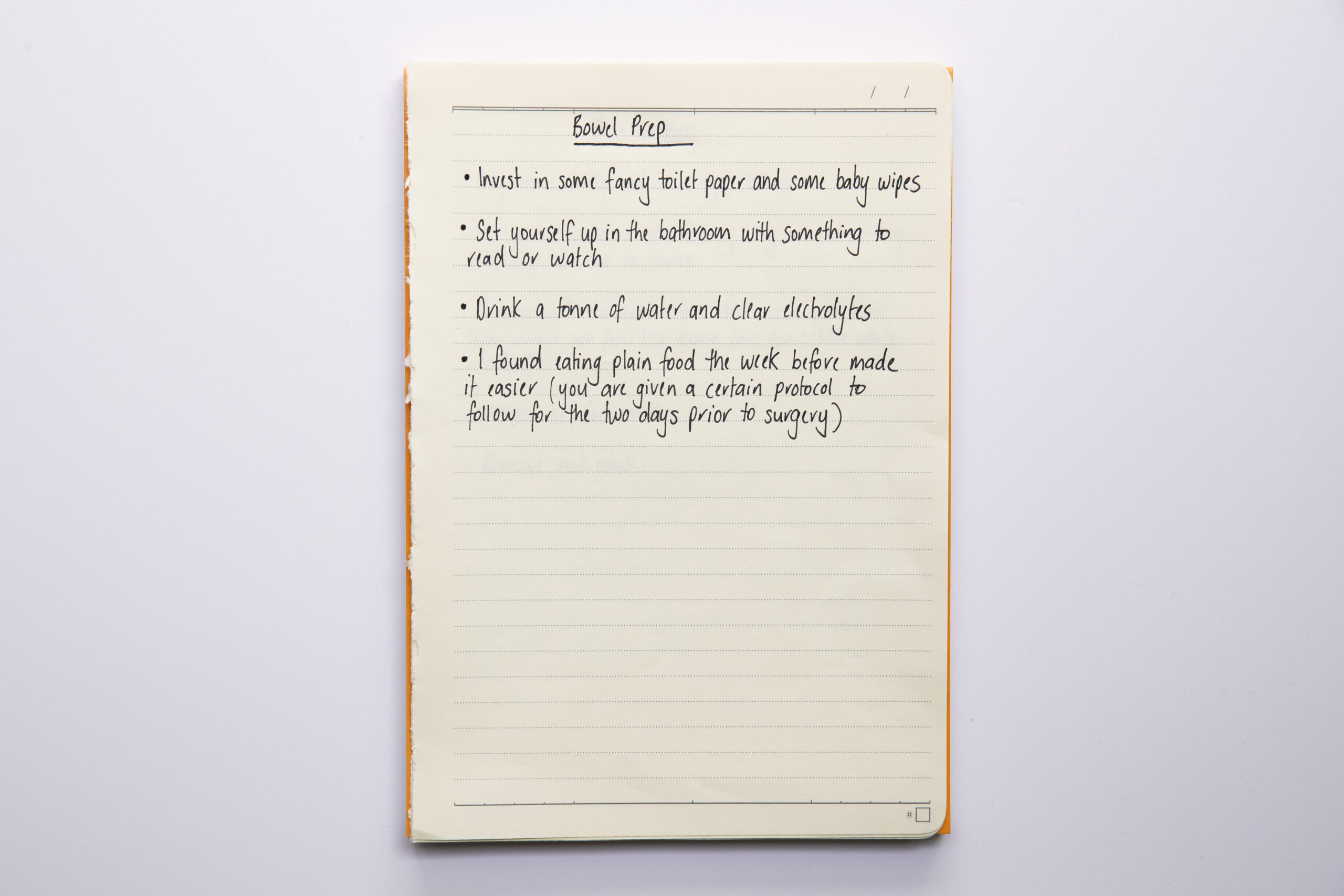
- Invest in some fancy toilet paper and some baby wipes
- Set yourself up in the bathroom with something to read or watch.
- Drink a tonne of water and clear electrolytes
- I found eating plain food for a week before the prep made it easier (you are given a certain protocol to follow for the two days prior).
Helpful things to take to hospital
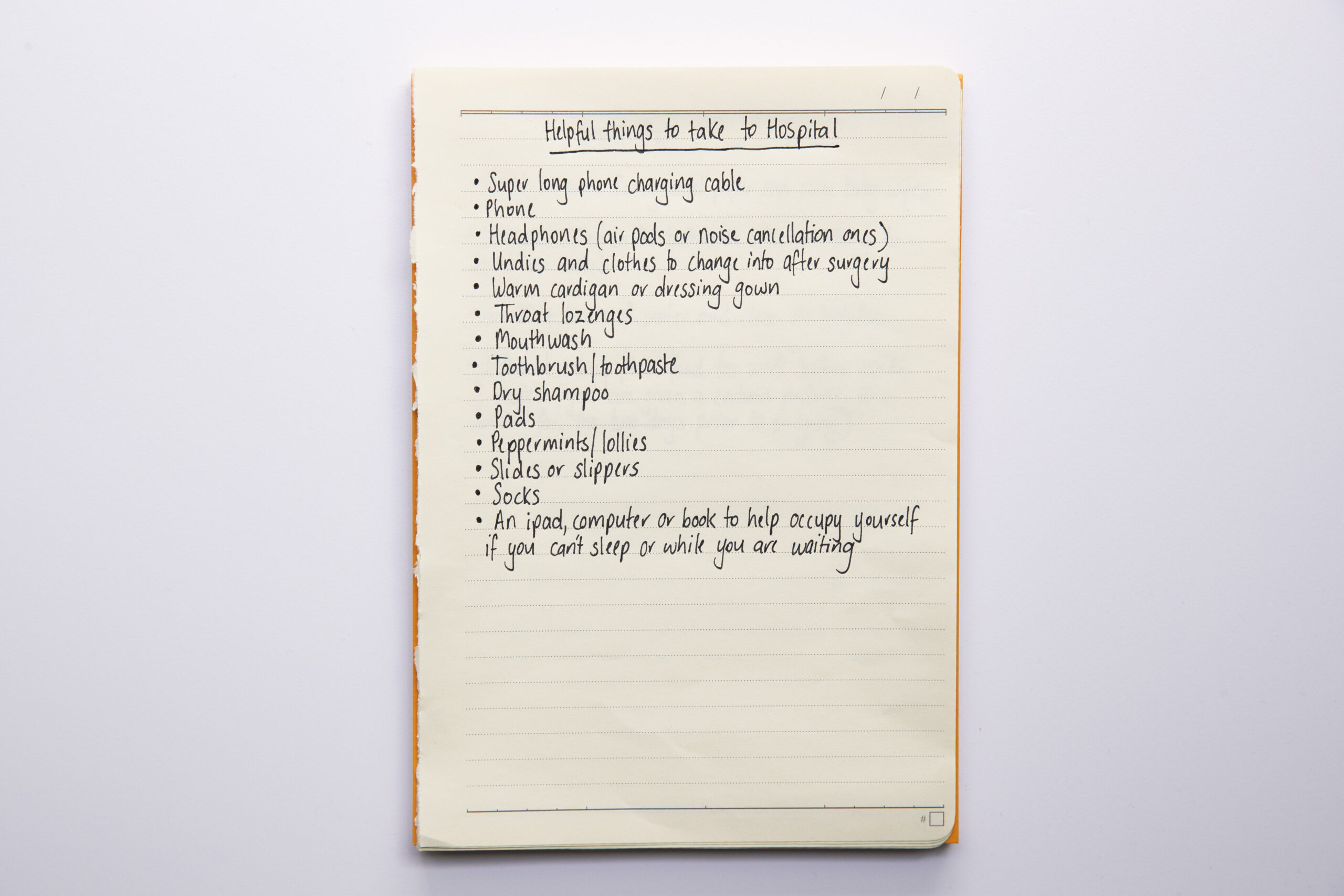
- Super long phone charging cable
- Phone
- Headphones (air pods or noise cancellation ones are great)
- Undies and clothes to change into after surgery
- Warm cardigan or dressing gown
- Throat lozenges
- Mouthwash
- Toothbrush/toothpaste
- Dry shampoo
- Pads
- Peppermints/ lollies
- Slides or slippers
- Socks
- An iPad, computer or book to help occupy yourself if you can’t sleep or while you are waiting.
Post-surgery
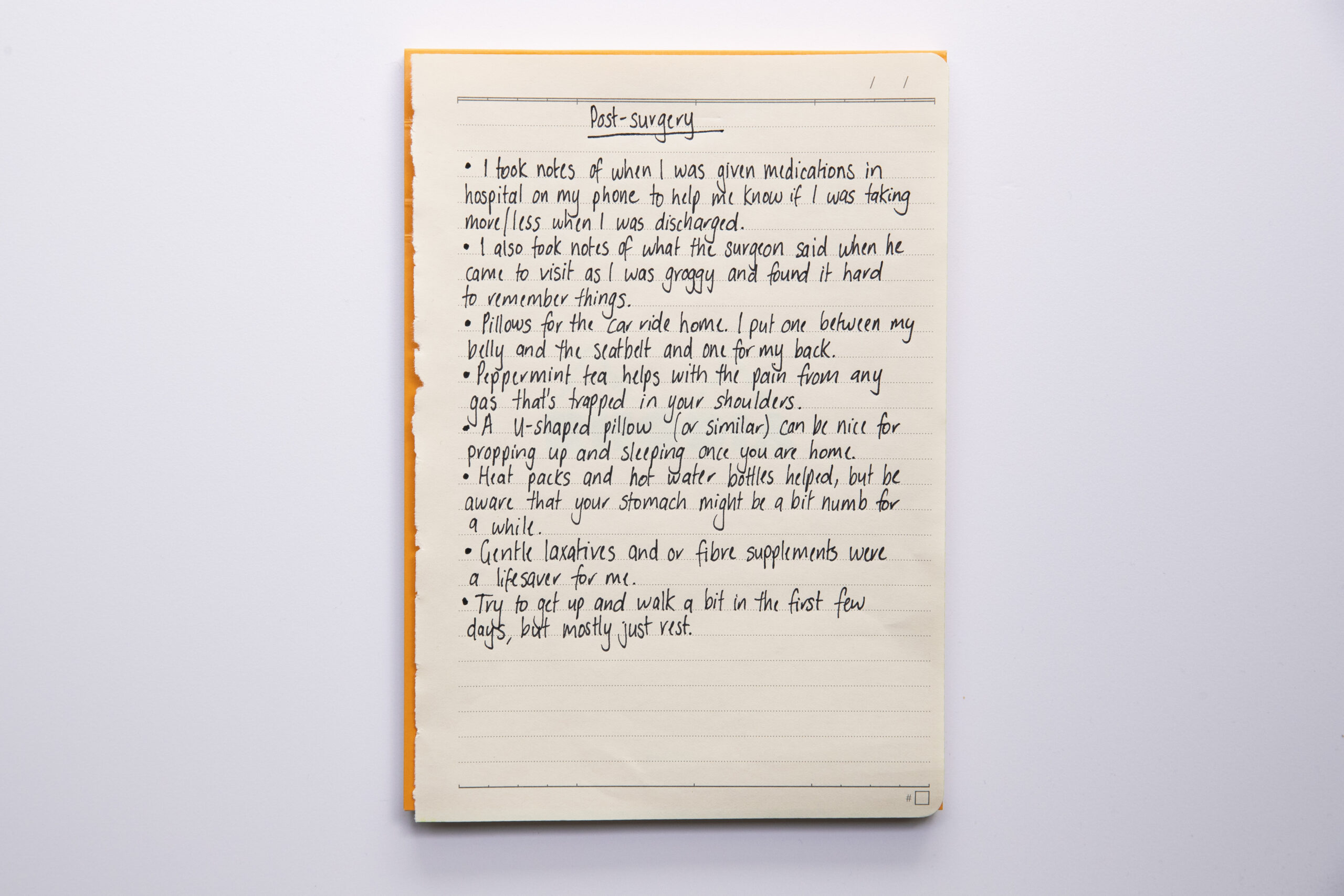
- I took notes of when I was given medications in hospital on my phone to help me know if I was taking more/less when I was discharged.
- I also took notes of what the surgeon said when he came to visit as I was groggy and found it hard to remember things.
- Pillows for the car ride home. I put one between my belly and the seatbelt and one for my back.
- Peppermint tea helps with the pain from any gas that’s trapped in your shoulders.
- A U-shaped pillow (or similar) can be really nice for propping up and sleeping once you are home.
- Heat packs and hot water bottles helped, but be aware that your stomach might be a bit numb for a while.
- Gentle laxatives and or fibre supplements were a lifesaver for me.
- Try to get up and walk a bit in the first few days, but mostly just rest.
With love and calm thoughts particularly for anyone about to have surgery or preparing for it.
Rach X
Written by,
Rachel Burke

